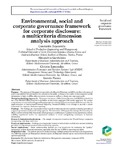| dc.contributor.author | Zopounidis, Constantin | |
| dc.contributor.author | Garefalakis, Alexandros | |
| dc.contributor.author | Lemonakis, Christos | |
| dc.contributor.author | Passas, Ioannis | |
| dc.date.accessioned | 2022-01-17T12:09:23Z | |
| dc.date.available | 2022-01-17T12:09:23Z | |
| dc.date.issued | 2020-12-11 | |
| dc.identifier.issn | 0025-1747 | |
| dc.identifier.uri | http://hdl.handle.net/11728/12095 | |
| dc.description | Research paper | en_UK |
| dc.description.abstract | Purpose
The purpose of this paper is to provide to the Board of Directors and CEOs of a firm to be aware of and accountable for the information they provide to the public. As long as the quality of the companies’ public information is high, it will be able to retain its investors as well as to obtain new ones more easily.
Design/methodology/approach
This paper introduces a Multi-Criteria Decision Aid (MCDA) tool with the use of the PROMETHEE II method to formulate an alternative aggregate ESG quality approach. We conduct comparisons in a sectorial and regional based perspective during different exam periods before and after the implementation of International Financial Reporting Standards (IFRS), in an attempt to provide a robust framework for corporate disclosure reporting.
Findings
The findings are of particular interest to both scholars and decision-makers, including providers of corporate governance indices and rating agencies. The innovation of this paper lies among others in using the MCDA method with the ESG framework, which proposes a combination of qualitative and quantitative criteria, enabling experienced and/or not experienced analysts to avoid manipulating techniques in business information.
Research limitations/implications
The sample of companies based on the US and Europe companies incorporating only large-sized ones.
Practical implications
Findings are of particular interest to both scholars and decision-makers including providers of corporate governance indices and rating agencies.
Social implications
Better understanding features pay key importance for increasing the “quality” information in firms financial statements, especially after the use of IFRS in reporting standards.
Originality/value
The authors proceed to analysis using a multiple perspective use that is decomposed into the following options: (a) Time-period oriented option, (b) Regional-oriented option and (c) Sectoral-oriented option respectively. | en_UK |
| dc.language.iso | en_US | en_UK |
| dc.publisher | Emerald Publishing Limited | en_UK |
| dc.relation.ispartofseries | Management desicion;vol. 58, no. 11, pp. 2473-2496, 2020 | |
| dc.rights | © 2020 Emerald Publishing Limited | en_UK |
| dc.rights.uri | http://creativecommons.org/licenses/by-nc-nd/4.0/ | en_UK |
| dc.subject | Research Subject Categories::SOCIAL SCIENCES | en_UK |
| dc.subject | ESG disclosures | en_UK |
| dc.subject | Narrative information | en_UK |
| dc.subject | Management commentary | en_UK |
| dc.subject | Composite KPI’S | en_UK |
| dc.subject | Ma.Co.Index | en_UK |
| dc.subject | MCDA methods | en_UK |
| dc.subject | Promethee II | en_UK |
| dc.title | Environmental, social and corporate governance framework for corporate disclosure: a multicriteria dimension analysis approach | en_UK |
| dc.type | Article | en_UK |
| dc.doi | 10.1108/MD-10-2019-1341 | en_UK |


